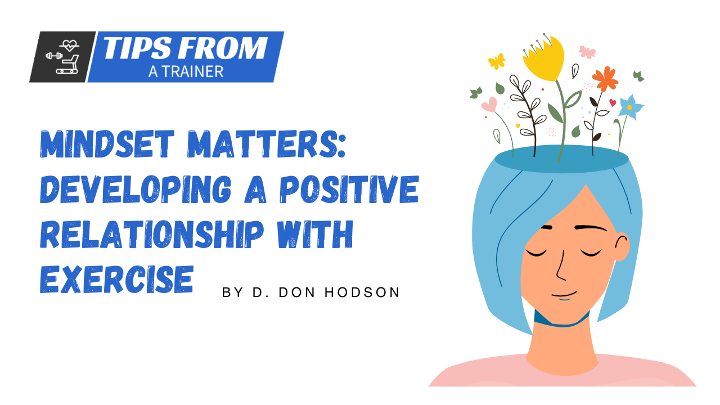Introduction
Exercise is not just about physical fitness; it's also about cultivating a positive mindset that supports long-term health and well-being.
In this article, we will explore the importance of developing a positive relationship with exercise and how it can enhance your fitness journey.
By understanding the power of mindset and adopting strategies to cultivate a positive mindset, you can transform exercise from a chore to a fulfilling and enjoyable part of your life.
Table of Contents
Introduction
The Power of Mindset in Exercise
What is Mindset?
The Impact of Mindset on Exercise
Shifting Perspectives: From Punishment to Self-Care
Changing the Narrative
Finding Activities You Enjoy
Setting Realistic Goals and Tracking Progress
Goal Setting Strategies
Tracking Progress
Embracing Self-Compassion and Positive Self-Talk
Practicing Self-Compassion
Positive Self-Talk
Cultivating a Supportive Environment
Surrounding Yourself with Positivity
Engaging in Group Activities
Conclusion

The Power of Mindset in Exercise
What is Mindset?
Mindset refers to the attitudes, beliefs, and thoughts we hold about ourselves and the activities we engage in, including exercise.
The Impact of Mindset on Exercise
Motivation and Consistency
A positive mindset can fuel motivation and help maintain consistency in your exercise routine.
Perseverance and Overcoming Challenges
A positive mindset enables you to persevere through challenges, setbacks, and plateaus that may arise during your fitness journey.
Enjoyment and Fulfillment
Cultivating a positive mindset allows you to find joy, satisfaction, and fulfillment in the process of exercising.
Shifting Perspectives: From Punishment to Self-Care
Changing the Narrative
Embracing Self-Care
Viewing exercise as an act of self-care rather than a punishment can transform your relationship with it.
Appreciating Your Body
Developing gratitude for your body's abilities and focusing on what it can do rather than how it looks can promote a positive mindset.
Finding Activities You Enjoy
Explore Different Options
Try various forms of exercise until you find activities that you genuinely enjoy and look forward to.
Incorporating Variety
Introduce variety into your routine to keep things interesting and prevent boredom.
Setting Realistic Goals and Tracking Progress
Goal Setting Strategies
SMART Goals
Set Specific, Measurable, Attainable, Relevant, and Time-bound goals that align with your fitness aspirations.
Process-Oriented Goals
Focus on the process and effort put into exercise rather than solely on outcome-based goals.
Tracking Progress
Journaling
Maintain a workout journal to track your progress, celebrate achievements, and reflect on the positive changes you experience.
Non-Scale Victories
Recognize and celebrate non-scale victories such as increased energy, improved mood, or enhanced endurance.
Embracing Self-Compassion and Positive Self-Talk
Practicing Self-Compassion
Kindness and Understanding
Treat yourself with kindness and understanding, acknowledging that progress takes time and effort.
Acceptance of Setbacks
Embrace setbacks as learning opportunities rather than reasons for self-criticism.
Positive Self-Talk
Identifying Negative Thoughts
Recognize negative self-talk patterns and challenge them with positive, empowering thoughts.
Affirmations and Mantras
Incorporate positive affirmations and mantras into your exercise routine to boost confidence and motivation.
Cultivating a Supportive Environment
Surrounding Yourself with Positivity
Supportive Relationships
Seek the support of friends, family, or a workout buddy who share similar fitness goals and values.
Positive Role Models
Look up to inspiring individuals who embody a positive mindset and motivate you to stay committed to exercise.
Engaging in Group Activities
Group Classes or Workouts
Participate in group classes or workouts to experience the energy, camaraderie, and motivation they provide.
Online Fitness Communities
Join online fitness communities to connect with like-minded individuals, share experiences, and seek guidance.
Conclusion
Developing a positive relationship with exercise is crucial for long-term adherence and enjoyment. By understanding the power of mindset, shifting perspectives, setting realistic goals, practicing self-compassion, and cultivating a supportive environment, you can transform exercise into a fulfilling and empowering journey.
Remember, it's not just about the physical benefits; it's about nurturing your mental and emotional well-being through movement.

Don Hodson, Certified Personal Trainer
I'm Don, an ACE-certified personal trainer and the founder of Tips From A Trainer. With my passion for fitness and years of experience, I've helped countless individuals transform their physiques!
Having personally overcome weight challenges throughout my life, I understand the struggle. Through consistency, exercise, and a balanced diet, I have managed to stay in shape and I want to share my message with the world!
The fitness industry is fraught with misconceptions and deceptive practices, which is why I am committed to providing you with the truth.
- My Site: www.Don-Hodson.com
- My Company: www.ConnectedAgeMarketing.com

Developing a Positive Relationship with Exercise